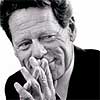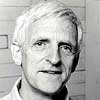
|
||
|
||
|
Sunday, August 31, 2003
Raging Against the Vatican
 Envoy Magazine's Carl Olson blogs on the "Luther complex" of the controversial priest Hans Küng, whose memoir My Struggle for Freedom is due for publication in November: Envoy Magazine's Carl Olson blogs on the "Luther complex" of the controversial priest Hans Küng, whose memoir My Struggle for Freedom is due for publication in November: There is no denying Küng's intelligence and scholarly brilliance . . . but the Christian Faith is not about being smarter than other people. It is ultimately about humility and holiness, both being gifts of God through Christ. From what I have read, Kung's arrogance is legendary. Contrast that with the incredible humility of Cardinal Ratzinger, once a colleague of Kung's, whose work for the Church has exhibited the sort of humility, strength, firmness, charity, and pastoral vision one expects from a true disciple of Christ. I've actually enjoyed some of Fr. Küng's books, particularly those on interreligious dialogue. I'm currently reading Christianity & World Religions, a collection of essays by Küng and two other scholars on Hinduism, Buddhism, & Islam, and I am definitely interested in reading his memoirs (particularly his reflections on Vatican II and his early years at the University of Tübingen, when he and Cardinal Ratzinger were colleagues). But I concur with Olson's criticism of Küng's arrogance -- his greatest flaw is his preoccupation with himself and his dissent with the Vatican. Two dominant themes that have influenced Küng's work is his vision of a "global ethic" for the world's religions 1 and his conception of a "paradigm change" in the development of Christian theology, the latter hermeneutic derived from the philosopher of science Thomas Kuhn. Unfortunately, Küng's attempts to apply paradigm analysis to religious history are not always productive, and result in obscuring the subject. This was the impression I received reading Küng's massive Christianity: Essence, History & Future (Continuum, 1996), which I am amused to find placed alongside other 'introductions to Christianity' in Catholic bookstores. Likewise, Eugene Fisher says of his earlier work Judaism: Between Yesterday and Today: Küng attempts to summarize all of the Jewish history and thought through paradigm theory. But in this instance that theory turns into a procrustean bed. A key test of any attempt to describe another religious tradition is whether members of that tradition will actually see themselves in the attempted description. In this case, I do not believe that very many Jews will see Judaism depicted here either accurately or sympathetically. This book tells us a lot about what kind of religion would be an ideal one in Küng's mind. But it tells us almost nothing about what Judaism in its many manifestations over the centuries has been, is, or could be. In short, it fails to live up to its title.2 It is appropriate that Dr. Fisher places Küng's work alongside that of Rosemary Radford Reuther in the 'Polemical' category in his biography, rather than 'Introductions and General Overviews' of Judaism. Returning to Carl's description of Küng's "Luther complex", Allen Mittleman describes this book as a "challenge to reform [Jewish] tradition along Küngian theological lines", and criticizes Küng's furious polemic against "the Law", concluding: "his profound hostility to the dominant mode of Jewish piety impairs his ability not only to interpret Judaism but to converse with Jews. I have no duty to listen to someone who evidently holds my way of life in contempt."3 Stripped of his authorization to teach as a Catholic theologian in 1979, Küng still bears a great deal of resentment towards the Vatican. This chip on his shoulder becomes increasingly more explicit in his later works. His latest work, The Catholic Church: A Short History, is not so much a 'history' as an opportunity for him to reiterate his earlier criticisms of papal infallibility and the Vatican heirarchy.
What "global ethic" is for Küng, "creation spirituality" is to Matthew Fox -- the perfect antidote to the many ills (racism, sexism, patriarchy, et. al.) that pervade the Catholic Church and society as a whole. Fox is anything but modest about this achievement: as he proclaimed to one interviewer, "one of my main works or accomplishments was recovering the mystical tradition of Christianity." 4. According to Fox, Christianity has been spiritually-destitute ever since St. Augustine came up with the doctrine of original sin, and has made it his personal mission to repair the damage by propogating his notion of "original blessing." With this end in mind, Fox re-translated Meister Eckhart and St. Hildegard of Bingen, and in turn used his own translations (rather than the original texts) as basis for his theology. And in a ploy that truly has to be read to be believed, Fox assembled snippets from various writings of St. Thomas Aquinas into a "dialogue" with himself. Readers of Sheer Joy: Conversations with Thomas Aquinas on Creation Spirituality will be hardly suprised to find that this great Doctor of the Church was actually a medieval proponent of Matthew Fox's thought. 5 Such a move provoked scientist & theologian Lawrence Osborn to wonder: This immediately raises the question of whether the authors in question are being allowed to speak for themselves. On closer examination, it appears that they are, in fact, being subjected to a bed of Procrustes. That mythological character used to measure travelers against his bed - if they fell short they were stretched to fit, if they were overlong amputation was the order of the day. 6 In what some may consider to be a blessing in disguise, Fox left the Dominicans and joined the Episcopalians in 1994, where he continues to promote creation spirituality and "the techno-cosmic mass." As Douglas LeBlanc comments in his review of Confessions, "Matthew Fox has the exegetical and theological savvy to become a bishop in the postmodern Episcopal Church." 8 Hans Küng and Matthew Fox, along with a host of other dissenting Catholics or ex-Catholics (John Cornwell, Garry Wills, James Carroll, et al.) have carved out a niche for themselves by raging against the Vatican. They've sold many books and much attention has been lavished upon them, especially in this time of crisis in the Church. But as Carl Olson says, "[Kung's] work is the product of a particular era and does not contain the timeless qualities that exist in the work of Ratzinger, Pope John Paul II, and others." Decades from now I imagine that Catholics will still be studying the encyclicals of Pope John Paul II. I do not think these authors will enjoy such lasting appeal. Note: Gerard Serafin has blogged on the alleged reconciliation with Hans Kung proposed by Cardinal Angelo Sodano.
Labels: kung, matthew fox
|

Against The Grain is the personal blog of Christopher Blosser - web designer
and all around maintenance guy for the original Cardinal Ratzinger Fan Club (Now Pope Benedict XVI).
Blogroll
Religiously-Oriented
"Secular"
|
|
 However, when it comes to autobiographies extolling one's intellectual brilliance & lamenting martyrdom at the hands of the Vatican, Küng could certainly take lessons from the progressive Episcopalian/former-Dominican
However, when it comes to autobiographies extolling one's intellectual brilliance & lamenting martyrdom at the hands of the Vatican, Küng could certainly take lessons from the progressive Episcopalian/former-Dominican 












